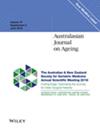Implementing Australia's new guidelines for appropriate psychotropic medication use in residential aged care: Applying the Consolidated Framework For Implementation Research
Abstract
Objectives
Accumulating evidence about psychotropic medication-related adverse events has had minimal apparent impact on overall rates of psychotropic medication use across Australian residential aged care facilities (RACFs). Australia's new Clinical Practice Guidelines for the Appropriate Use of Psychotropic Medications in People Living with Dementia and in Residential Aged Care were released in April 2023. This study aimed to identify contextual factors to inform strategies to implement the new Guidelines in Australian RACFs.
Methods
A qualitative study using semi-structured interviews was conducted with the participants representing four Australian residential aged care organisations. The interviews were recorded, transcribed verbatim, coded and thematically analysed. Factors were deductively coded using the Consolidated Framework for Implementation Research (CFIR) into three domains: outer setting, inner setting and individuals, which subsequently informed the fourth CFIR domain—implementation process.
Results
Participants (n = 33) were aged care residents and their family members, occupational therapists, nurses, nurse practitioners, general practitioners, geriatricians and pharmacists. The outer setting factors included regulatory changes, increased workload and increased workforce demand. The inner setting factors were health digitalisation, governance and compliance culture. Individual factors included mindset towards psychotropics and staff capabilities. The implementation process domain comprised four key strategies—recognising workforce pressures, leveraging recent efforts, supporting local use of data and supporting team functioning.
Conclusions
These outer setting, inner setting and individual factors represent an interconnected framework of potentially modifiable factors to guide the targeted implementation of Australia's new Guidelines. These four key strategies provide new approaches to support the translation of the Guidelines.


 求助内容:
求助内容: 应助结果提醒方式:
应助结果提醒方式:


